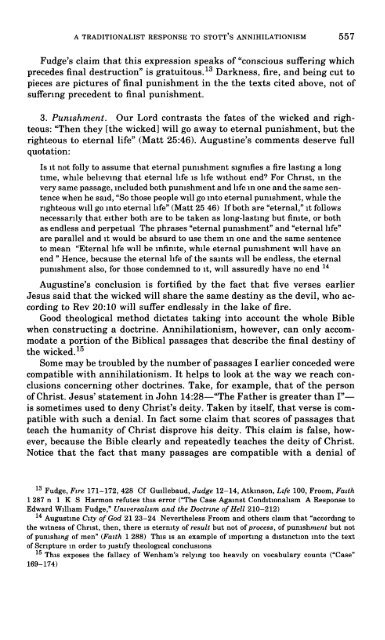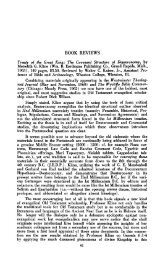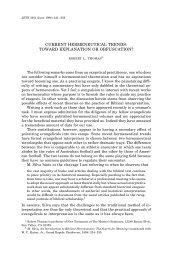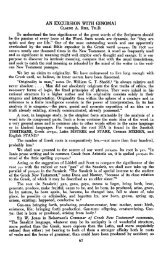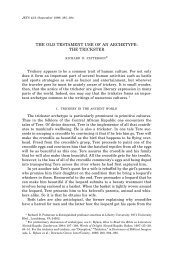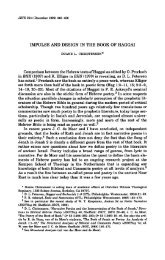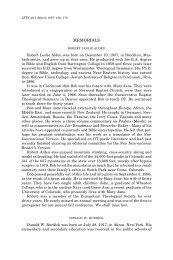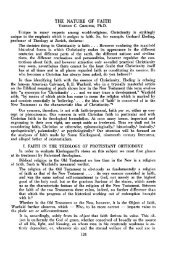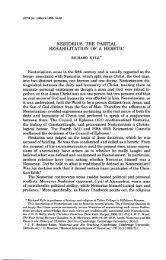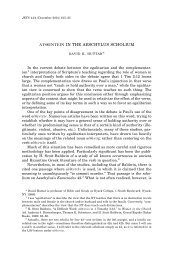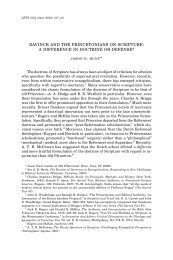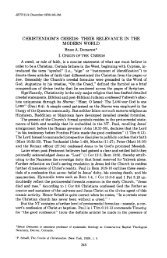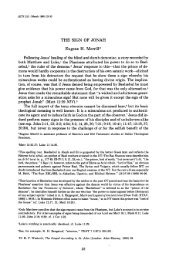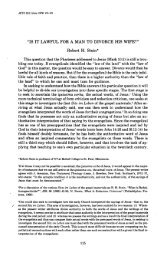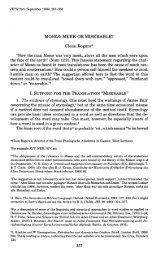a traditionalist response to john stott's arguments for annihilationism
a traditionalist response to john stott's arguments for annihilationism
a traditionalist response to john stott's arguments for annihilationism
You also want an ePaper? Increase the reach of your titles
YUMPU automatically turns print PDFs into web optimized ePapers that Google loves.
A TRADITIONALIST RESPONSE TO STOTT'S ANNIHILATIONISM 5 5 7<br />
Fudge's claim t h a t this expression speaks of "conscious suffering which<br />
1 3<br />
precedes final destruction" is gratui<strong>to</strong>us. Darkness, fire, and being cut <strong>to</strong><br />
pieces are pictures of final punishment in the the texts cited above, not of<br />
suffering precedent <strong>to</strong> final punishment.<br />
3. Punishment. Our Lord contrasts the fates of the wicked and righteous:<br />
"Then they [the wicked] will go away <strong>to</strong> eternal punishment, but the<br />
righteous <strong>to</strong> eternal life" (Matt 25:46). Augustine's comments deserve full<br />
quotation:<br />
Is it not folly <strong>to</strong> assume that eternal punishment signifies a fire lasting a long<br />
time, while believing that eternal life is life without end ? For Christ, in the<br />
very same passage, included both punishment and life in one and the same sentence<br />
when he said, "So those people will go in<strong>to</strong> eternal punishment, while the<br />
righteous will go in<strong>to</strong> eternal life" (Matt 25 46) If both are "eternal," it follows<br />
necessarily that either both are <strong>to</strong> be taken as long-lasting but finite, or both<br />
as endless and perpetual The phrases "eternal punishment" and "eternal life"<br />
are parallel and it would be absurd <strong>to</strong> use them in one and the same sentence<br />
<strong>to</strong> mean "Eternal life will be infinite, while eternal punishment will have an<br />
end " Hence, because the eternal life of the saints will be endless, the eternal<br />
punishment also, <strong>for</strong> those condemned <strong>to</strong> it, will assuredly have no end u<br />
Augustine's conclusion is <strong>for</strong>tified by the fact t h a t five verses earlier<br />
Jesus said t h a t the wicked will share the same destiny as the devil, who according<br />
<strong>to</strong> Rev 20:10 will suffer endlessly in the lake of fire.<br />
Good theological method dictates taking in<strong>to</strong> account the whole Bible<br />
when constructing a doctrine. Annihilationism, however, can only accommodate<br />
a portion of the Biblical passages t h a t describe the final destiny of<br />
1 5<br />
the wicked.<br />
Some may be troubled by the number of passages I earlier conceded were<br />
compatible with <strong>annihilationism</strong>. It helps <strong>to</strong> look at the way we reach conclusions<br />
concerning other doctrines. Take, <strong>for</strong> example, t h a t of the person<br />
of Christ. Jesus' statement in J o h n 14:28—"The F a t h e r is greater t h a n I " —<br />
is sometimes used <strong>to</strong> deny Christ's deity. Taken by itself, t h a t verse is compatible<br />
with such a denial. In fact some claim t h a t scores of passages t h a t<br />
teach the humanity of Christ disprove his deity. This claim is false, however,<br />
because the Bible clearly and repeatedly teaches the deity of Christ.<br />
Notice t h a t the fact t h a t many passages are compatible with a denial of<br />
l d Fudge, Fire Π1-112, 428 Cf Guillebaud, Judge 12-14, Atkinson, Life 100, Froom, Faith<br />
1 287 η 1 Κ S Harmon refutes this error ("The Case Against Conditionahsm A Response <strong>to</strong><br />
Edward William Fudge," Universahsm and the Doctrine of Hell 210-212)<br />
Augustine City of God 21 23-24 Nevertheless Froom and others claim t h a t "according <strong>to</strong><br />
the witness of Christ, then, there is eternity of result but not of process, of punishment but not<br />
of p u m s h mg of men" (Faith 1 288) This is an example of importing a distinction in<strong>to</strong> the text<br />
of Scripture in order <strong>to</strong> justify theological conclusions<br />
1 5 This exposes the fallacy of Wenham's relying <strong>to</strong>o heavily on vocabulary counts ("Case"<br />
169-174 )


